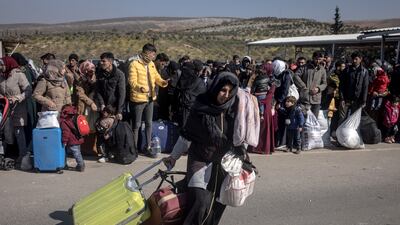The United Nations launched a $1 billion appeal on Thursday to help more than 5 million survivors of the devastating earthquake last week in Turkey, the largest to hit the country in a century.
Earlier this week, the UN also started a $397 million appeal to assist about 5 million Syrians across the border in the rebel-held north-west.
UN spokesman Stephane Dujarric was peppered with questions about why the appeal for Turkey is targeted at only 5.2 million people when according to the UN and the government more than 15 million people were affected.
He also was asked why the appeal for Turkey is two and a half times larger than the one for Syria to help almost the same number of people.
Mr Dujarric said the Turkish appeal “was designed in very close co-operation with the government of Turkey, which is leading the relief efforts”.
“This is the number they came up with for the focus on people who need the most humanitarian aid, most quickly, and where the UN can be most effective,” he said.
He said Turkey had “a very efficient search and rescue and humanitarian system".
More appeals to follow
As for the disparity in the amount of the appeals, Mr Dujarric said part of the reason was that “there is already a well-established humanitarian community which has been working in Syria” and that before the quake there was a $4.8 billion humanitarian appeal for Syria for 2023.
“So there’s already a humanitarian pot of money that exists for Syria, which did not exist for Turkey,” he said.
Both appeals are for emergency funds for the next three months, and will be followed by fresh appeals for longer-term help.
While announcing the funding for Turkey, UN Secretary General Antonio Guterres said this will allow aid groups to rapidly scale up support for government-led relief efforts, including providing food, protection, education, water and shelter to survivors.
“The needs are enormous, people are suffering and there’s no time to lose,” Mr Guterres said.
“I urge the international community to step up and fully fund this critical effort in response to one of the biggest natural disasters of our times.
"Turkey is home to the largest number of refugees in the world and has shown enormous generosity to its Syrian neighbours for years”, so it is time for the world to support the Turkish people, he said.
Exemptions for Turkish banks
Aid and donations by Turkish banks to help earthquake victims will not be subject to limits set by the nation’s banking law, according to a presidential decree.
The decree exempts lenders from the legal donation limit of 0.4 per cent of equity and will be in force until the end of the three-month state of emergency that was declared after the February 6 earthquake.
Turkish lenders, led by state-run banks, announced sizeable donations during a fund-raising marathon broadcast live on February 15. Ziraat Bank, the biggest lender by assets, is donating 20 billion liras ($1.1 billion), while Vakifbank pledged 12 billion liras and Halkbank 7 billion liras.
More than 1.74 million refugees live in the 11 Turkish provinces affected by the earthquake, according to the UN refugee agency.
'Unspeakable heartache'
UN humanitarian chief Martin Griffiths, who visited both quake-ravaged countries last week, said: “The people of Turkey have experienced unspeakable heartache.”
The earthquake struck at the peak of winter destroyed around 47,000 buildings, leaving hundreds of thousands of people, including small children and the elderly, without access to shelter, food, water, heaters and medical care in freezing temperatures.

“We must stand with them in their darkest hour and ensure they receive the support they need,” Mr Griffiths said.
Slow response
The UN has been criticised for the slow response in getting aid and heavy equipment into Syria’s rebel-held north-west.
On Monday, following a visit to Damascus, Mr Griffiths announced that Syrian leader Bashar Al Assad had agreed to open two additional crossing points from Turkey to the north-west — at Bab Al Salam and Al Raee — for an initial period of three months.
The UN had only been allowed to deliver aid to the north-west Idlib area through a single crossing at Bab Al Hawa, at Syrian ally Russia’s insistence.
Mr Dujarric said 22 lorries with food and other aid crossed through Bab Al Hawa on Monday and two lorries with tents crossed through Bab Al Salam on Thursday.
No convoys had yet entered the north-west from Al Raee.
“As of February 14, according to the latest information we received, 8,900 buildings have been completely or partially destroyed in the north-west of Syria, leaving 11,000 people homeless,” he said.
Mr Al Assad on Thursday thanked his "Arab brothers" for aid supplied in the aftermath of the earthquake.
The Syrian leader received calls from the leaders of several Arab countries, including those that cut off ties with Syria more than a decade ago over bloodshed during its civil war.
Some 120 planes laden with assistance have landed at the country's airports, about half of them from the UAE which restored ties with Syria in late 2018.

